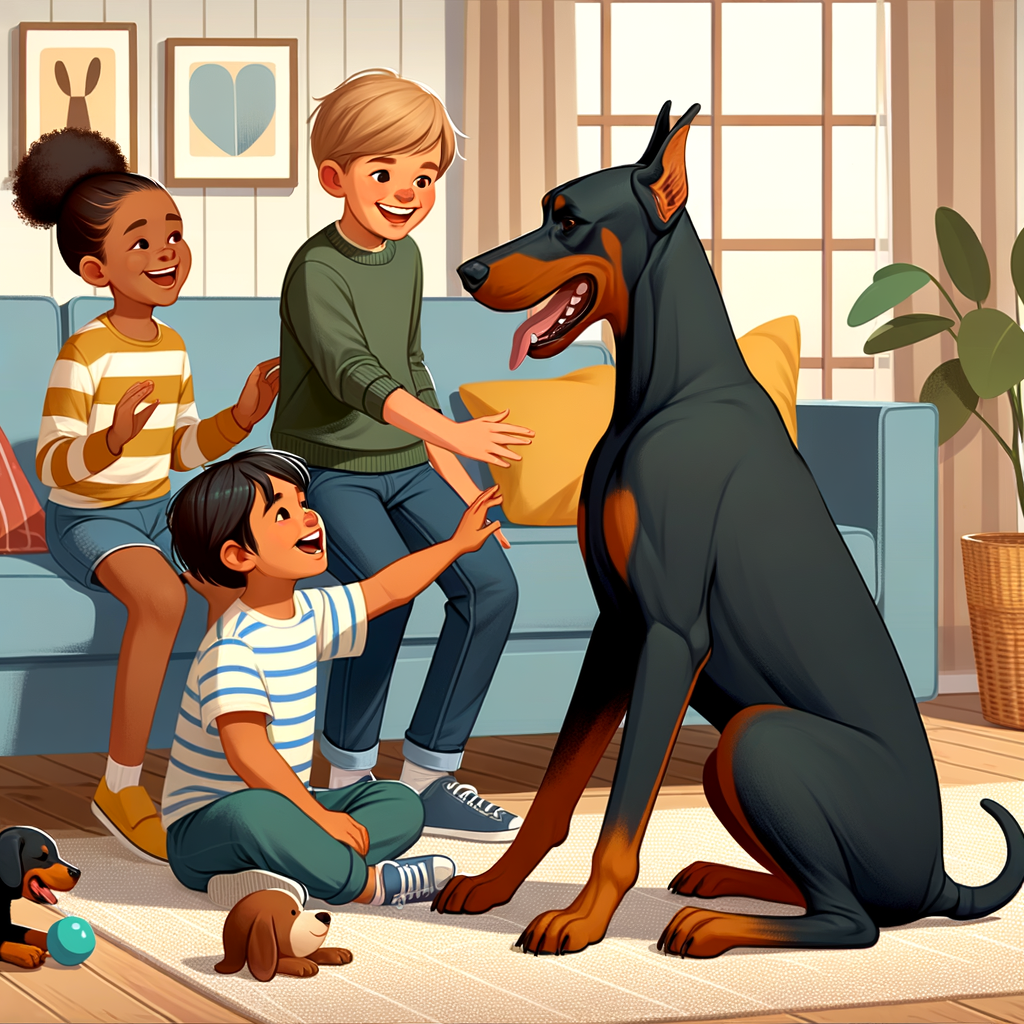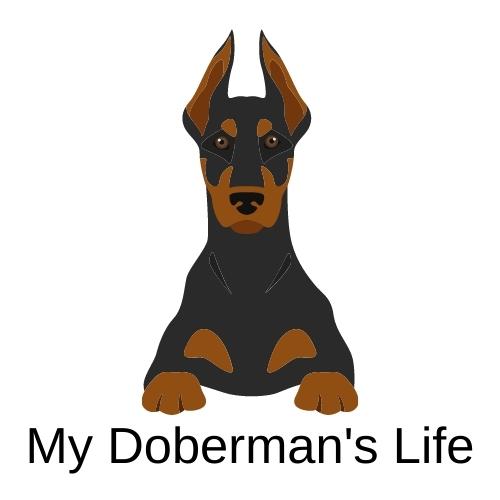
Introduction to Dobermans as Family Pets
Dobermans are a breed of domestic dog originally developed around 1890 by Karl Friedrich Louis Dobermann, a tax collector from Germany. They are known for their loyalty, intelligence, and strong protective instincts. This makes them excellent family pets, provided they are properly trained and socialized.
- Overview of the Doberman breed
- Common misconceptions about Dobermans
- Why consider a Doberman as a family pet?
The Doberman breed is medium-large in size, with a square build and a compact muscular body. They are known for their endurance and speed. Dobermans are intelligent and trainable, making them ideal for various roles such as police and military work, search and rescue, and therapy.
Despite their reputation as aggressive dogs, Dobermans are actually quite friendly and protective. They are often misunderstood due to their strong appearance and protective instincts. However, with proper training and socialization, they can be gentle and loving companions. The key is to treat them with respect and kindness, just like any other breed.
Dobermans are loyal, intelligent, and protective, which makes them excellent family pets. They are great with children and can be trained to behave well around other pets. They are also known for their loyalty and will go to great lengths to protect their family. However, they require regular exercise and mental stimulation due to their high energy levels and intelligence.
In conclusion, Dobermans can make great family pets if they are properly trained and socialized. They are loyal, protective, and intelligent, making them ideal for families who can provide them with the love, care, and stimulation they need.
Understanding the Doberman Temperament
When it comes to understanding the temperament of a Doberman, there are several key aspects to consider. These dogs are known for their intelligence, loyalty, and protective nature. Let’s delve deeper into the general behavior of Dobermans, their suitability for families, and their interaction with kids.
- General behavior of Dobermans
- Doberman’s suitability for families
- Doberman’s interaction with kids
Dobermans are often seen as energetic and intelligent dogs. They are quick learners and have a strong desire to please their owners, which makes them highly trainable. Despite their intimidating appearance, Dobermans are generally friendly and social animals. They are known for their loyalty and have a strong protective instinct towards their families.
Dobermans can make excellent family pets when they are properly trained and socialized. They are protective and loyal, making them great watchdogs. However, they require a lot of exercise and mental stimulation due to their high energy levels and intelligence. Therefore, they are best suited for active families who can provide them with the physical and mental stimulation they need.
Dobermans can get along well with children, especially when they are raised together. They are protective and can be gentle with kids they know. However, due to their size and energy, they might accidentally knock over smaller children. Therefore, it’s important to supervise interactions between Dobermans and young kids. Teaching children how to interact with dogs is also crucial to ensure a harmonious relationship.
In conclusion, understanding the Doberman’s temperament is key to ensuring a successful and happy relationship with this breed. They are intelligent, loyal, and protective dogs that can make excellent family pets when given the right training and socialization.
Training a Doberman
Training a Doberman is an essential part of raising a well-behaved and happy pet. This section will cover the basics of training a Doberman, including the importance of early training and key techniques to use.
Basic Training
Basic training is the foundation of any successful dog training program. It’s where your Doberman will learn the essential commands and behaviors that will make them a good pet and family member.
- Importance of Early Training
- Key Training Techniques for Dobermans
Starting training early is crucial when it comes to Dobermans. Puppies are like sponges, ready to absorb all the information they can. Training should ideally start as soon as your Doberman puppy is brought home, typically around 8 weeks old. Early training helps to establish good habits and prevent the development of bad ones. It also helps to build a strong bond between you and your Doberman, which is essential for effective training.
Dobermans are intelligent and eager to please, which makes them highly trainable. However, they also have a strong will and can be stubborn, so it’s important to use the right training techniques.
One effective technique is positive reinforcement, which involves rewarding your Doberman for good behavior. This can be done with treats, praise, or playtime. It’s important to reward your Doberman immediately after they display the desired behavior, so they associate the reward with the behavior.
Another key technique is consistency. Make sure to use the same commands and signals each time, and ensure all family members are on the same page. This will help your Doberman understand what is expected of them.
Lastly, patience is key. Training takes time and progress may be slow. But with patience and persistence, your Doberman will eventually learn the desired behaviors.
In conclusion, basic training is a crucial part of raising a well-behaved Doberman. By starting early and using the right techniques, you can help your Doberman become a great pet and family member.
Advanced Training
Training a Doberman doesn’t stop once they are no longer a puppy. It’s a continuous process that extends into their adulthood. This is especially true for Dobermans, a breed known for their intelligence and energy. Let’s delve into the importance of continuing training and specialized training for Dobermans.
- Continuing Training into Adulthood
Continuing training into adulthood is crucial for Dobermans. It helps them stay mentally stimulated and physically active. It also reinforces the bond between you and your pet. According to the American Kennel Club, adult dogs can learn new tricks and commands just as effectively as puppies.
Continuing training can include advanced obedience training, agility training, or even learning fun tricks. It’s also a great way to address any behavioral issues that may arise as your Doberman grows.
- Specialized Training for Dobermans
Dobermans are a unique breed with specific training needs. They are intelligent, energetic, and protective. This means they can excel in various specialized training areas, such as protection training, search and rescue training, and even therapy dog training.
Specialized training should always be conducted by a professional or under professional guidance to ensure it’s done correctly and safely. Remember, the goal of training is not just to teach your Doberman commands, but also to help them become well-behaved and happy family members.
| Training Type | Description |
|---|---|
| Advanced Obedience Training | Teaches your Doberman to follow complex commands and behave well in various situations. |
| Agility Training | Helps your Doberman stay physically active and mentally stimulated. It also strengthens the bond between you and your pet. |
| Protection Training | Trains your Doberman to protect you and your family. This should always be done under professional guidance. |
| Search and Rescue Training | Trains your Doberman to find missing persons or objects. This can be a rewarding activity for both you and your pet. |
| Therapy Dog Training | Trains your Doberman to provide comfort and support to people in hospitals, nursing homes, schools, and more. |
In conclusion, advanced and specialized training are key to raising a well-behaved and happy Doberman. They not only keep your pet mentally stimulated and physically active, but also strengthen the bond between you and your pet.
Raising a Doberman in a Family
Dobermans, with their sleek coat, athletic build, and regal appearance, can make a great addition to your family. However, raising a Doberman in a family setting requires understanding and effort. Here are some key aspects to consider:
- Introducing a Doberman to a Family
- Doberman’s Behavior with Other Pets
- Ensuring a Safe Environment for Kids and Dobermans
Introducing a Doberman to your family should be a gradual process. Start by allowing the dog to explore its new environment under your supervision. It’s important to establish a routine early on, including feeding times, walks, and playtime. This helps the Doberman understand its role within the family and reduces anxiety.
Dobermans are known to be protective and sometimes territorial, which can lead to issues with other pets. However, with proper socialization, they can learn to coexist peacefully. Introduce your Doberman to other pets slowly and in a controlled environment. Reward positive interactions to encourage good behavior.
While Dobermans are generally friendly and protective towards children, it’s crucial to teach your kids how to interact with the dog. Simple rules like not disturbing the dog while it’s eating or sleeping can go a long way in preventing any potential issues. Also, never leave a young child unsupervised with any dog, including Dobermans.
In conclusion, raising a Doberman in a family requires time, patience, and understanding. But with the right approach, these intelligent and loyal dogs can make wonderful family pets.
Case Studies: Dobermans as Family Pets
Let’s delve into real-life examples of Dobermans as family pets. These case studies will provide a clear picture of what it’s like to have a Doberman as part of your family.
-
Case Study 1: Doberman as a Household Dog
Meet Max, a two-year-old Doberman who lives with the Johnson family in New York. The Johnsons have two children, aged 8 and 10. Max was brought into the family as a puppy and has grown up alongside the children.
Max is a well-behaved dog who loves to play with the children. He is protective of his family, but he is also friendly to visitors. The Johnsons have trained Max to behave appropriately around people and other dogs. They report that Max is an intelligent dog who learns commands quickly and is easy to train.
The Johnsons also note that Max requires a lot of exercise. They take him for two long walks every day, and he also enjoys playing in the yard with the children. Despite his high energy levels, Max is also content to relax with the family in the evenings.
-
Case Study 2: Doberman as a Family Companion
Next, we have Bella, a three-year-old Doberman who lives with the Smith family in California. The Smiths are a couple who live alone, and Bella is their only pet.
Bella is a loyal and affectionate dog who loves to spend time with her owners. She is well-trained and behaves well both at home and when out in public. The Smiths report that Bella is a great companion who loves to join them on hikes and trips to the beach.
Like Max, Bella also requires a lot of exercise. The Smiths take her for a long walk every morning and play with her in the yard in the afternoons. They report that Bella is a happy and healthy dog who has brought a lot of joy to their lives.
These case studies show that Dobermans can make great family pets. They are intelligent, loyal, and affectionate dogs who can adapt well to family life. However, they do require a lot of exercise and training to ensure they are well-behaved and happy.
Conclusion: Is a Doberman Good for Families?
- Recap of the Doberman’s traits and behavior: Dobermans are known for their loyalty, intelligence, and strong protective instincts. They are energetic dogs that require regular exercise to keep them happy and healthy. With proper training, they can be obedient and well-behaved. They are also known for their ability to form strong bonds with their families, showing a deep affection for their human companions. However, they can be wary of strangers and may need socialization training to ensure they behave well around new people and animals.
- Final thoughts on the suitability of Dobermans for families: The suitability of a Doberman for a family largely depends on the family’s lifestyle and ability to meet the dog’s needs. If the family is active and can provide the Doberman with the physical and mental stimulation it needs, then a Doberman can make a great family pet. They can be excellent companions for children, provided they are properly trained and socialized. However, families with very young children or those who cannot commit to regular exercise and training may want to consider a different breed. In conclusion, Dobermans can be good for families, but they are not the best fit for everyone.








